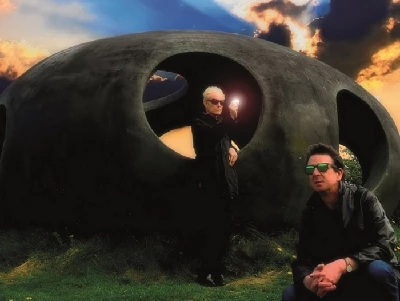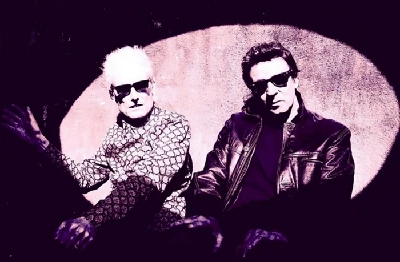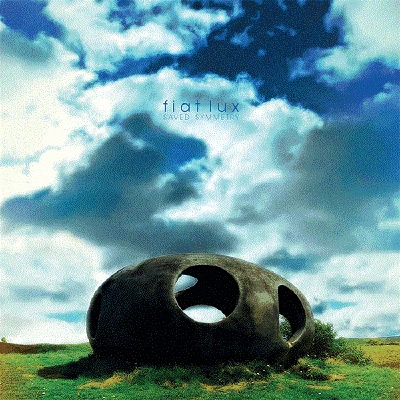published: 24 /
4 /
2019

John Clarkson speaks to synthpop band Fiat Lux about their reformation after an absence of over thirty years, the reissue of all their 80's material, and also their new album 'Saved Symmetry'.
Article
Fiat Lux were one of the great lost bands of the 1980s.
They were part of the wave of synthpop groups that arose in the early part of that decade, but broke with convention by combining their synthesizers with other instrumentation including guitars, Indian instruments and most notably Ian Nelson’s saxophone.
Fiat Lux was formed in 1982 by drama students Steve Wright (vocals, synthesizers, percussion) and David P. Crickmore (synthesizers, guitars, percussion) in Wakefield in West Yorkshire. They soon after released their debut single ‘Feels Like Winter’ on local experimental musician and cult artist Bill Nelson‘s (Be Bop Deluxe, Red Noise) label Cocteau Records, by which time Nelson’s younger brother Ian (synthesizers, saxophone, clarinet), whom Wright and Crickmore had met separately, had also joined the group.
‘Feels Like Winter’ drew the attention of major label Polydor, who signed Fiat Lux. They released four singles and a six-song mini-album, ‘Hired History’, through Polydor. Their second single ‘Secrets’, which received a lot of airplay on Radio 1 DJ Annie Nightingale’s show in particular, stalled at no. 65 while its follow-up ‘Blue Emotion’, climbed a few places higher to no. 59. When their fourth single ‘House of Thorns’ failed to chart, and Polydor refused to release their full-length debut album ‘Ark of Embers’, which Fiat Lux had recorded with producer Hugh Jones (Echo & The Bunnymen, Simple Minds, The Sound, The Damned), Crickmore quit the trio. Wright and Nelson stayed together for one last single, ‘Solitary Lovers’, in early 1985, but later on that year broke up. ‘Commercial Breakdown’, a full-length video which contained the singles and other tracks from ‘Hired History’ and ‘Ark of Embers’, was released posthumously in 1990.
Wright and Crickmore reunited Fiat Lux in 2017 after an absence of over thirty years, initially beginning again by recording a new version of ‘Secrets’, but without Ian Nelson who had tragically died in his sleep in 2006 on the day of his fiftieth birthday.
2019 is an eventful year for Fiat Lux. In March they released its second studio album, ‘Saved Symmetry’, on indie label Splid Records, with guest musician Will Howard taking Nelson’s place on saxophone and clarinet. April has seen the release on Cherry Red of a double CD ‘Hired History Plus’, which as well as the mini-album contains all of Fiat Lux’s singles and B-sides, and, after years of Wright and Crickmore trying to win its rights back, the entire ‘Ark of Embers’ album.
Pennyblackmusic spoke to Steve Wright and David Crickmore about the reissue, ‘Saved Symmetry’ and Fiat Lux’s reformation.
PB: It has been almost thirty-five years since Fiat Lux originally split up. Why did you decide to get back together in 2017 after such a long absence?
DAVID CRICKMORE: It was sort of arbitrary that we had to do it. Steve and I had been in touch throughout what we might call ‘the dormant years’, but during a lot of that time we had been trying to get some of our master tapes back in order to do something with them. We had been battling record labels over that for a good five years, before we decided to something different to progress things along.
I was already running a recording studio and recording musicians that were asking for and wanting to make similar noises to Fiat Lux. I, therefore, still had all the kit and equipment necessary to make a sound similar to Fiat Lux, so I said to Steve, “Why don’t we try and remake one of our signature songs, put that out just tentatively and see what happens?” It had the dual purpose of reigniting the Fiat Lux flame, plus it also helped to start re-negotiations with the record labels about getting our old 80’s stuff back.
STEVE WRIGHT: It was great fun re-recording ‘Secrets 2017’. We listened to it and thought, “We could do more of this.” It was the spur to us rewriting new material. It took some time, but there was a great sense of camaraderie in the studio.
PB: Why did you choose to rework ‘Secrets’? Was it because it is probably your best known song?
SW: Yes, it is the one that has endured the most during the period that we have been inactive. It was always the favourite of Annie Nightingale, for instance, and it kept appearing on her request show which carried on for some years after we stopped. I think because of that it had a bit more familiarity in the public domain than some of our other songs, and also it was one that we could easily replicate without having to rely on anyone too strongly to do the Ian Nelson bit. There is a bit of clarinet in there that Kathryn Roberts did for us, who is a well-known folk artist, but there is no major Ian solo in it, and, therefore, we thought that it was the most sensible thing to start with really.
PB: Were the bulk of the songs on ‘Saved Symmetry’ written in the past two years since you reformed?
DC: Yes, most of them were. There are a few bits and pieces that aren’t. There is a song that Steve wrote called ‘Calling on Angels’ after I left Fiat Lux which is in there. There are three songs - ‘Grey Unpainted Rooms’, ‘We Can Change the World’ and ‘Wasted (On Baby Tears)’ - that I wrote, just after I left Fiat Lux, my head still being in the Fiat Lux space as it were, but most of the songs we have conceived and written together since we reformed.
PB: Ian Nelson is co-credited with you both on one track, ‘Hold Me While You Can’, on ‘Saved Symmetry’. When was that song written?
DC: That was written in the very last days of the three of us working as Fiat Lux. It was originally conceived in Amazon Studios which we used quite a lot, and it was worked upon with the last batch of songs that we did in Rockfield Studios in Wales towards the unreleased album, ‘Ark of Embers’. It was never properly finished so it was a kind of fragment, but we really wanted to do a version of it because we really loved it and felt that it was a shame that we never got to complete it back in then. It is a completely new version of it, but it has its roots back in those days. That is why Ian is in the credits of that because he had a part in the songwriting back in the 80s.
PB: The title track is the one instrumental on the record. Why did you decide to call the new album that and what does that title suggest to you?
DC: It was going to be ‘Saved Symmetry’ before we had an actual tune with a song designated with that title. We were looking for a title that that chimed with things like ‘Hired History’ or ‘Commercial Breakdown’. They tended to be Ian titles, and slightly cynical (Laughs). He was like the Ringo of the band in that he was always looking for ‘A Hard Day’s Night’ titles of things. We really thought about what Ian might like to call it, and we thought that ‘Saved Symmetry’ conjured up something of where we were. We had kind of saved a group that had become non-existent, and there was a symmetry in what we are doing now and what we did then.
SW: Although Ian is not around anymore, we always keep him in mind and how he might have done things. We did with the title, and have done that also when we were writing new material as well.
PB: Lyrically there seems to be a hard-earned optimism and sense of hope to songs such as ‘Tuesday’, ‘Hold Me While You Can’, ‘Everyday in Heaven’ and ‘It’s You’. Was it a conscious decision to write songs in that vein or was that what developed?
SW: It was just what developed. There was no “We are going to write a positive one now and now we are going to write one that is slightly more melancholy.” That is just what came up.
DC: We were in the right sort of environment in our head for optimism. A lot of the songs were reflecting on the idea of us getting back together, and, while we were thinking sometimes about Ian Nelson not being there and there were all sorts of things embedded in them, it was really just the atmosphere of the sessions that heightened that.
PB: Who is Will Howard who plays saxophone on the new album?
DC: Will is someone that I came across by lucky chance really. In my other capacity, I work for the BBC, and some of the time I do production stuff for them also. I got put on this project going round various shopping precincts in West Yorkshire for a Christmas celebration for one of the programmes that we do here. We had various music acts that we were featuring during the course of the week, and we were putting something on in a place in Leeds, and they had this sort of roving brass band for one of the shows. It was nothing to do with me because I just pointed one of the microphones at them basically, but this lot were absolutely fantastic and all the players were top-notch. Will was the lead saxophone player in this outfit. We were looking for some means of putting the saxophone on the record now that Ian is no longer there, and I just thought, “Yeah, this guy is right for this” I had a word with him after the programme was finished, and we swapped details, and he was willing to come and do it. Basically he did it as a session guy, and was very good too.
SW: He didn’t at all copy what Ian had done before which was fantastic. He took that flavour and he gave it his own lovely tone and expertise. He was emphatic towards the tracks which was wonderful to see and hear.
PB: You have often been branded as a synthpop band, yet your music was always more complex than that involving a lot of other instruments. Is ‘synthpop’ a term that you like when hearing your music described?
SW: There was a lot of synths involved with what we were doing in 1983/84, but there was also lot of other ‘real’ instrumentation involved, such as, for example, the sax and the clarinet. We also used marimbas and a tabla. We try to keep that alive today really. My perspective of it is that we are a synthpop act, but the extra instrumentation gives it another dimension, another texture, another imagination.
DC: I think that it something that has made the music that we made back in the mid-1980s still sound reasonably relevant today. It does have that mix of real instruments and electronica intertwined, which is what a lot of people are returning to. I think if we had been a synthesizer act only we would have sounded less universal in modern music today.
PB: One can hear some similarity with Fiat Lux with other acts that came along later a couple of years in the 1980s such as Black and A-ha? Do you think that was just down to coincidence?
SW: Wouldn’t it have been lovely to hear them say yes (Laughs)? We have got no idea. That was the technology that was available at the time, and that was the prevailing mood and that kind of feel was popular. I would love to know if we had some kind of influence on these really successful acts and artists. I think it would be a bit smug though to think that was there any influence there.
DC: It is interesting to note the similarities. It was not something that we were aware of back then, but it was something that people keep pointing out to us these days, and you look back and think, “That’ s similar actually, I wonder,” but, unless somebody was prepared to delve into people’s paper work and to find out if they had any Fiat Lux records hidden away in there, who knows?
PB: You had been doing well in 1983 and 1984. You had toured with Blancmange and Howard Jones, were playing a lot of headline gigs, and were receiving steady airplay on Radio 1 and had had two small hits with ‘Secrets’ and ‘Blue Emotion’. You seemed on the brink of possible success. Why did Polydor decide not to release the ‘Ark of Embers’ album?
SW: The mood in those days was different, and the mood amongst majors at the time was that if you didn’t have a hit single they couldn’t sell an album on the back of it. We were told that they weren’t going to release the album because we hadn’t had a Top 40 hit. That was it, more or less.
DC: It was pretty objectionable. It became more and more demoralising for us when the one they said would be the breaker for us didn’t break. They kept saying to us, “Can you go back into the studio and think of another one, guys?” There are only so many times that you can do that before the thing cracks really. What is interesting talking about A-ha and other bands like that that came after us, rather than their influences, is what might have happened if we had signed to Warner Brothers rather than Polydor back in the day. Would we have the facilities to make the leap that was for some reason missing in Polydor at that time? I don’t think that Polydor had any great success at all in that period. It was just the luck of the draw really.
PB: ‘Ark of Embers’ is being released as part of the ‘Hired History Plus’ package. Is it pretty much as you left it in 1984?
SW: All of ‘Hired History Plus’ has been remastered, and there is loads more to it than there was in 1984. It is the first time that I have listened to ‘Ark in Embers’ in particular on CD and not off a cassette. It sounds fresh, crisp and textured. The difference between how it was then and how it is now is quite profound.
DC: The first disc contains the ‘Hired History’ mini-album, and all the other singles and B sides and their various mixes. Our ambition was to have disc two for the ‘Ark of Embers’ missing album. We have worked closely with Cherry Red, and that has been our biggest influence on the project. We are very pleased that that has turned out that way, and the listener can experience the album at last.
PB: Final question. You have been a studio act since you got back together. Will there eventually be live dates?
DC: Our main focus at present is studio work, but we are looking into that side of things. We are not ready to be a live band at the moment. We are looking at how that might work if we ever decide to tread the boards again.
It is a different world to the one we left back in the 1980s. It would have to be something worth seeing live and obviously we don’t have Ian Nelson to complete the line-up, so we would have to work out how we could do that, but it is something now that we have got a moment’s pause that we are thinking about.
PB: Thank you.
Band Links:-
http://www.fiat-lux.co.uk/
https://www.facebook.com/Fiatluxoffici
https://twitter.com/fiatluxofficial
Picture Gallery:-

